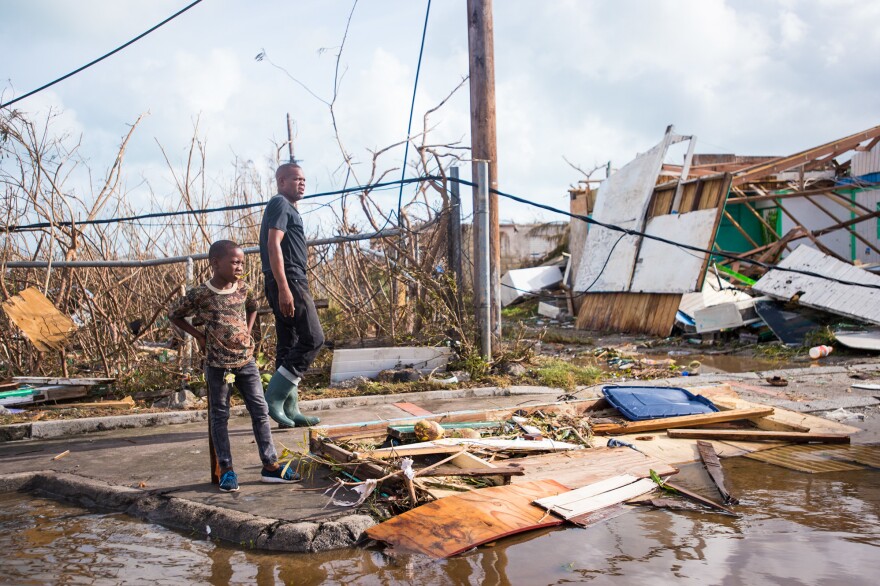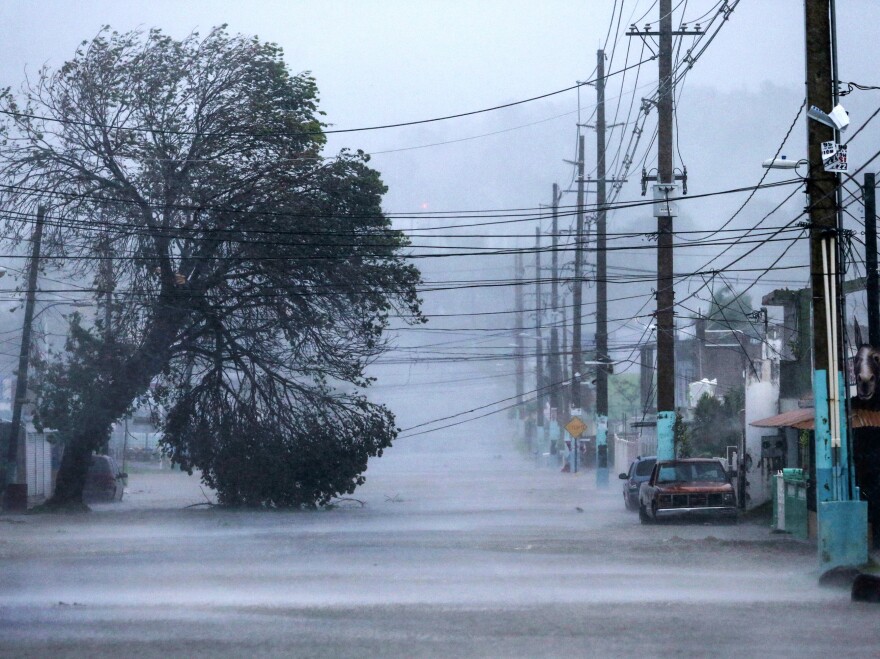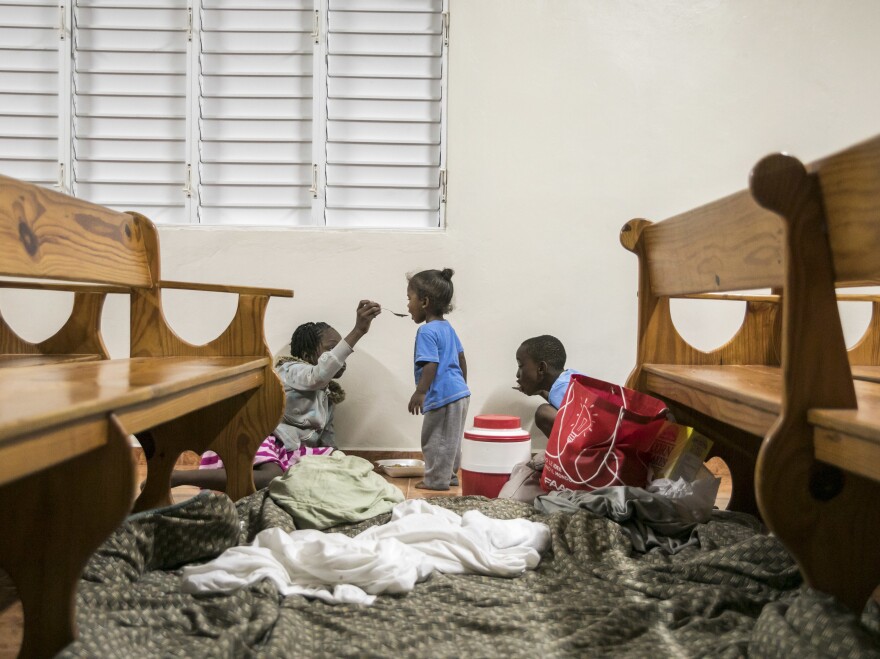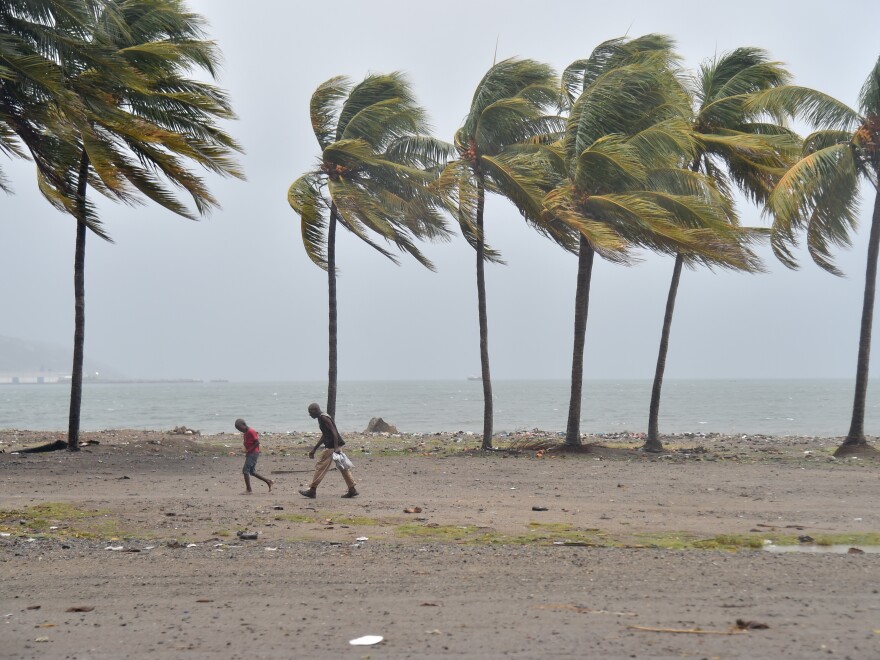Updated at 4:20 p.m. ET
A string of tiny Caribbean islands have been left stunned and devastated by the destructive force of Hurricane Irma, one of the strongest storms ever to hit the region. Some islands appear to have been spared, but others suffered loss of life and damage on a near-apocalyptic scale.
Antigua and Barbuda
In Barbuda, communications were severed as Irma made landfall just before midnight on Tuesday. Antigua, 25 miles to the south, dodged the full force of the storm, prompting Prime Minister Gaston Browne at first to declare it a miracle that his nation had been spared.
My heart breaks for #Barbuda pic.twitter.com/WWJ80yVQRj
— Therese Georgiev (@ThereseGeorgiev) September 7, 2017
But as it turned out, Browne had spoken too soon. It was only after communication began to be restored and he was able to visit Barbuda that the damage to the smaller of the two islands became clear.
"I journeyed to Barbuda this afternoon and what I saw was heart-wrenching, absolutely devastating," Browne said on state-owned television Wednesday afternoon. "In fact, I believe that on a per capita basis, the extent of the destruction in Barbuda is unprecedented. And it is unprecedented, based on the type of storm. Hurricane Irma would have been easily the most powerful hurricane to have stormed through the Caribbean, and it is extremely unfortunate that Barbuda was right in its path."
Browne told The Associated Press that nearly every building on the island has been damaged and that about 60 percent of the island's roughly 1,400 residents have been left homeless. He said at least one person, a child, had died.
St. Martin/Sint Maarten, St. Barthemely
Some six hours later, Irma smashed into St. Martin, about 60 miles northwest of Barbuda. The island was directly in the storm's path, and the half-French, half-Dutch island suffered horrendously as a result.

At least four bodies have been recovered on St. Martin, the French side of the island, according to French Prime Minister Edouard Philippe, who quoted one local official as saying that 95 percent of the island's houses had been damaged and 60 percent were uninhabitable. Earlier, France's interior minister said at least eight people had died. On the Dutch side of the island, Netherlands Prime Minister Mark Rutte said Thursday there was as yet "no clarity" on victims. However, he did say it was clear that devastation of "epic proportions" had been visited on the island.
Orkaanpassage #Irma nog in volle gang. Onze mensen en schepen zijn ter plekke. Klaar om te helpen zodra de mogelijkheid zich voordoet. pic.twitter.com/fCLcnhzrLH
— Koninklijke Marine (@kon_marine) September 6, 2017
French President Emmanuel Macron said his country was "grief-stricken" by the destruction on St. Martin. Macron tied the destruction to climate change, saying the world must act now "so we can avoid such natural disasters in the future."
St. Martin's famous Princess Juliana International Airport that abuts the beach (and has become a mecca for foolhardy tourists and thrill-seekers who brave the dangerous jet wash as planes take off) was badly damaged, as revealed by photographs tweeted by the Dutch navy, which has two ships stationed off the coast as part of relief efforts.
Airport St. Martin unreachable at the moment. High priority for the delivery of help and supplies. #Irma pic.twitter.com/7I8Qqmauvj
— Koninklijke Marine (@kon_marine) September 7, 2017
On the French island of St. Barthelemy, also known as St. Barts, floodwaters appeared to be the biggest problem. Photographs on social media showed severe flooding.
Anguilla
North of St. Martin, the low-lying British island of Anguilla took what U.K. Foreign Office Minister Alan Duncan described as the full force of Irma.
Damage, he said is "severe and in places critical."
But the British government's response to the crisis in Anguilla has prompted anger, NPR's Frank Langfitt reports from London. He says a former Anguillan official, Dorothea Hodge, told The Guardian newspaper that the U.K.'s response has been "pathetic" and "disgraceful." Hodge noted that unlike the French government, London failed to move ahead of the storm to set up an emergency fund and reconstruction plan for its Caribbean territories.
Virgin Islands
The British and U.S. Virgin Islands, popular tourist and charter boat destinations, were next in the path of Hurricane Irma. The outer bands of the approaching storm began to lash the islands early Wednesday afternoon.
Duncan said "severe damage" had resulted from the storm in the British Virgin Islands. Photographs tweeted of Road Town on Tortola showed much damage, and other pictures showed charter boats piled randomly into the corners of bays that had been considered safe shelter.
Irma found the Tortola's hurricane hole in Paraquita Bay #IrmaHurricane #Tortola pic.twitter.com/wXCMEI3juF
— John Clarke (@johnmclarkejr) September 6, 2017
Billionaire Richard Branson, who tweeted in advance of the storm Wednesday that he was retreating to the wine cellar on his privately owned Necker Island, was safe, along with everyone else on Necker. Branson's company, Virgin, issued a statement Thursday morning: "We are deeply saddened by the events that have taken place in the last 24 hours and our hearts and thoughts are with our friends and family in the Caribbean.
"We are very grateful to be able to report that all of our team on Island have been accounted for as safe as well. Necker Island felt the effects of Hurricane Irma and sustained extensive damage, the extent of which we are still assessing."
In the U.S. Virgin Islands, the government in the territory reported three fatalities on the main island of St. Thomas.
Gov. Kenneth Mapp said the U.S. territory had sustained "significant devastation."
"Sustained winds of 150 mph, gusts higher than that, for three or four hours is devastating," he said in a statement Thursday.
Mapp said a number of fire and police stations were wiped out and hospitals and medical facilities were damaged.
In a statement, the government in the capital, Charlotte Amalie, said, "The evacuation of patients from the heavily damaged Roy Lester Schneider Hospital of St. Thomas continues. Critical patients are being relocated to the Juan F. Louis Hospital on St. Croix, while others will be evacuated to hospitals nearby in Puerto Rico. U.S. military aircraft are being used to provide transport."
"A major priority continues to be the restoration of power," the statement said, adding that Mapp plans an overflight of St. Thomas and St. John to assess damage.
Puerto Rico

Although Irma passed just north of Puerto Rico, sparing it a full-on hit from the storm, the island's precarious electrical infrastructure couldn't withstand the glancing blow. More than 1 million Puerto Ricans were reportedly without electricity.
"It will be difficult to estimate how long the power outage will last," Puerto Rican Gov. Ricardo Rosselló said Thursday.

Rosselló added that ports on the island are still closed, and it's unclear when commercial flights will resume, according to the AP.
"We would like to start out thanking the Almighty," Rosselló was quoted by The New York Times as saying of the relatively small impact the storm had. "Our prayers were answered."
Schools and government offices are scheduled to reopen on Monday, the news service reports.
Dominican Republic
Although the storm was grazing the northern side of the Dominican Republic, rather than hitting it straight on, the director of the country's Emergency Operations Center, Juan Manuel Méndez, warned citizens not to be complacent.

He said that flooding was a major concern and that "the worst has yet to come."
"The rains will increase throughout the day [with] swells and strong winds on the north coast," Méndez said.
Haiti

Like the Dominican Republic, Haiti is only getting a sideswipe from Irma, but unlike its neighbor on the island of Hispaniola, the land in French-speaking Haiti has been largely denuded of trees, leaving it especially vulnerable to landslides and flooding from heavy rains.
Evacuations were ordered along the country's northern coast, including Tortuga island, but it wasn't known how many people heeded the order.
"It looks like Haiti won't get a direct hit from Irma, and that's fortunate because the country is still struggling to recover from Hurricane Matthew, which wiped out the country nearly a year ago," said Hervil Cherubin, country director for , a nonprofit working with 15,000 farming families across Haiti.
"Still, high winds and heavy rains will still likely cause destructive flooding and landslides. The Haitian people are still extremely vulnerable and really can't take much more of that," Cherubin said.
Copyright 2020 NPR. To see more, visit https://www.npr.org. 9(MDAxODg3MTg0MDEyMTg2NTY3OTI5YTI3ZA004))

